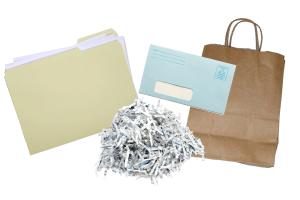Zero Waste
QUICK LINKS
Get Involved
Campus Gardens
Tired of sitting inside behind a computer? So are the students who manage our campus gardens. Come touch soil with them as they maintain the outdoor spaces that make our campus greener.
Student Sustainability Collective
Want to get involved with sustainability but not sure where to start? Visit the Sustainability Resource Center, which takes an interdisciplinary approach to making changes on campus.
Concerts and Events
Enjoy events like Bear Garden and Sun God? Student volunteers are always needed to work with the ASCE (Associated Students Concerts and Events) programming board to make these events zero waste.
Campus Sustainability Efforts
SSC Resource Map
Student ambassadors collected location data, photos and descriptions of campus composting locations to assist the Student Sustainability Collective update its campus resource map. This makes it easier for students to find compost bins and drop-off stations, which increases composting efforts.
Specialty Plastic Film Recycling
Plastic Beach is a nonprofit organization that promotes and facilitates the recycling of soft plastic packaging waste, including plastic wrap, bubble wrap and other film plastics, that cannot go into standard recycling bins. It collected and recycled plastic from Geisel Library and the UC San Diego Bookstore, helping to divert 350 lbs. of plastic in 2025, with more locations coming soon!
Centralized Waste Collection Pilot Program
UC San Diego is piloting a new Centralized Waste Collection program in Brian C. Malk Hall and the Coalition building within the Ridge Walk North Living and Learning Neighborhood. The initiative replaces individual desk-side waste bins with centralized stations for recycling, compost and landfill. The program will be expanded to additional buildings as implementation continues.
Waste Sorting Guidelines
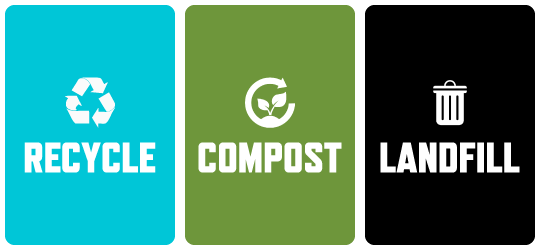
Recyclables
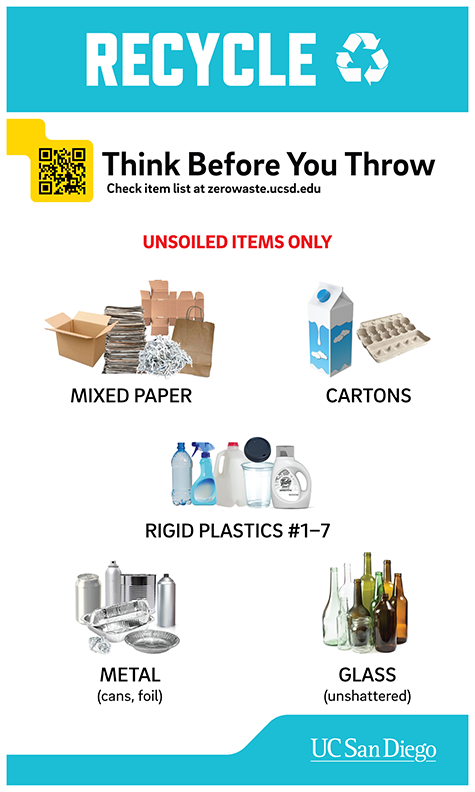 Attach this sign to the appropriate bin for use during your next event. We also recommend using a bin liner of the corresponding color to avoid contamination.
Attach this sign to the appropriate bin for use during your next event. We also recommend using a bin liner of the corresponding color to avoid contamination.
All recyclable materials can be placed in any campus recycling container, including office bins.
| Mixed Paper (without bindings, rubber bands or paper clips; staples don't need to be removed) |
|
|---|---|
|
|
|
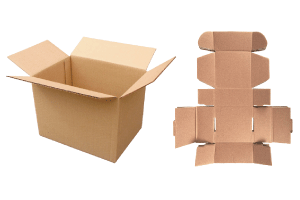 |
|
 |
|
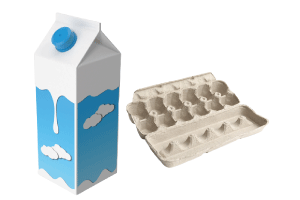 |
|
| Empty Containers (with lids removed) | |
 |
|
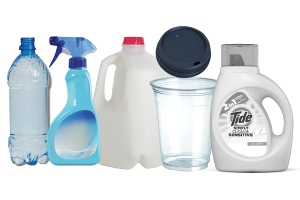 |
|
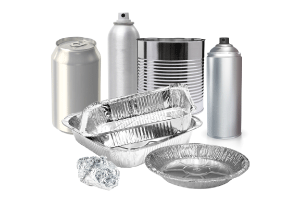 |
|
| Block Styrofoam | |
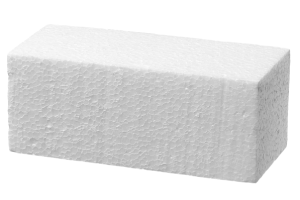 |
|
Be sure to:
- Keep all trash out of recycling containers.
- Flatten cans, plastic bottles and cartons whenever possible.
- Empty and flatten all cardboard boxes before placing them inside recycling containers. Do not leave boxes near bins, dumpsters or on loading docks.
- Empty liquids and food scraps from containers and ensure that they are clean and dry.
See how EDCO sorts items placed in recycling bins.
Note: Before purging paper files or generating large amounts of paper or beverage containers, contact the Facilities Management Customer Relations help desk, (858) 534-2930, at least 48 hours in advance to get a large temporary recycling container.
Other Recyclable Materials
- Building materials: Call (858) 534-2930 from 7 a.m. to 4:30 p.m., weekdays.
- Chemicals
- Empty toner cartridges
- Office equipment and furniture.
Compostables (Organics)
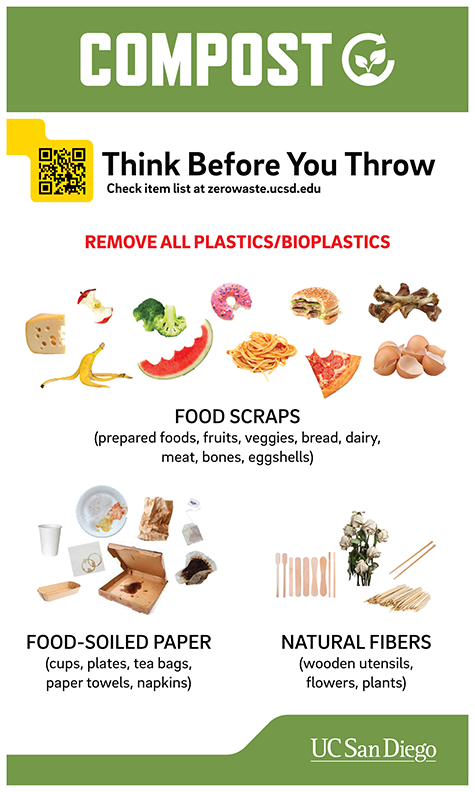 Attach this sign to the appropriate bin for use during your next event. We also recommend using a bin liner of the corresponding color to avoid contamination.
Attach this sign to the appropriate bin for use during your next event. We also recommend using a bin liner of the corresponding color to avoid contamination.
How do we define compost(able)?
At UC San Diego, compostable items include food scraps, unlined paper products and plant waste. Remember, not all items that are labeled “compostable” are accepted for composting, especially bio-plastics. UC San Diego expects that organics recycling will help us divert more than 1,000 tons of campus materials from landfills annually.
Organic Waste vs. Compost
Organic waste is any kind of waste that comes from living sources, such as plants or animals. This includes all kinds of food and yard waste, but it also includes things like paper, cardboard and hair.
Compost is the product created by the process of breaking down organic waste.
| Food Scraps | |
|---|---|
 |
Raw, cooked or spoiled:
|
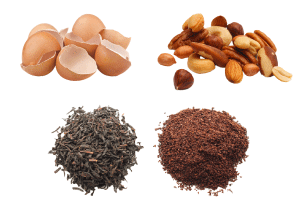 |
|
| Food-Soiled Paper | |
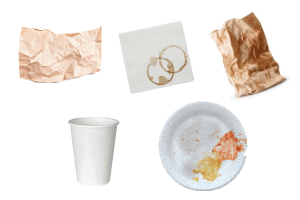 |
|
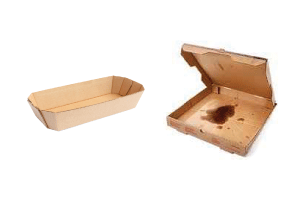 |
|
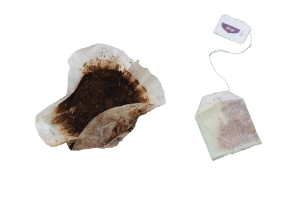 |
|
| Natural Fibers | |
 |
|
|
Some campus gardens accept these items in compost bins:
|
|
Be sure to:
Landfill
 Attach this sign to the appropriate bin for use during your next event. We also recommend using a bin liner of the corresponding color to avoid contamination.
Attach this sign to the appropriate bin for use during your next event. We also recommend using a bin liner of the corresponding color to avoid contamination.
| Soft and Small Plastics | |
|---|---|
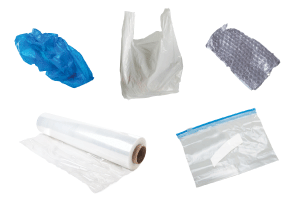 |
|
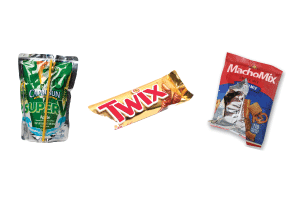 |
|
 |
|
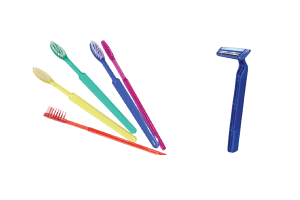 |
|
| Mixed Materials | |
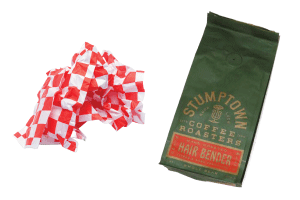 |
|
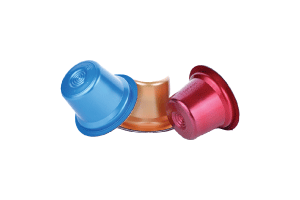 |
|
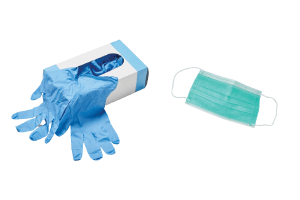 |
|
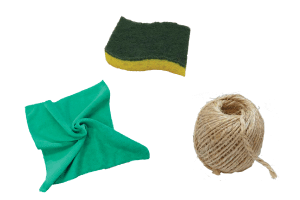 |
|
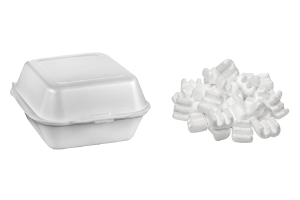 |
Styrofoam:
|
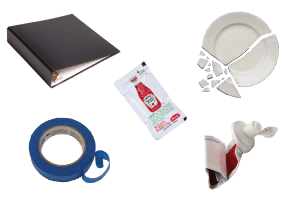 |
Other items:
|
How to dispose of:
- Universal and electronic waste
- Batteries:
- Faculty/Staff
- Students living on campus can take batteries to their Residential Life Office for disposal.
- Ink and toner cartridges
- Pens, markers (dry erase, highlighters, etc.) with or without caps and mechanical pencils
Mail Services consolidates and ships used writing instruments to TerraCycle, where they are transformed into fun, innovative products. You can upcycle your used writing instruments by placing them in an Intercampus Mail envelope labeled "used pens." - Aerosol cans
- Plastic film
- Other items: Visit earth911.com.
E-Waste and Hazardous Waste
Universal Waste
|
|
|
|
|
|
|
Additional items and disposal guidance
Hazardous Waste
|
|
|
Specialty Recycling Programs
|
|
|
|
|
|
Demystifying Zero Waste Terminology
How do we define zero waste?
The Zero Waste International Alliance defines Zero Waste as: “The conservation of all resources by means of responsible production, consumption, reuse, and recovery of products, packaging, and materials without burning and with no discharges to land, water, or air that threaten the environment or human health.”
At UC campuses, achieving zero waste means diverting 90% of our waste from the landfill and reducing our per person waste generation by 50% by 2030.
What is diversion?
Diversion is defined as the many efforts we use to reduce the percentage of waste we send to the landfill. This includes reusing and reselling items, recycling and collecting organic waste for composting or anaerobic digestion.
This is how we calculate diversion: (recycled material + composted material) / (total waste generated) x 100 = diversion rate (%)
As we work to reduce waste and reuse items, we should recognize that our actions may seem to lower our diversion rates. However, it’s also important to look at the total amount of waste we produce, not just the diversion percentage.
What is an anaerobic digester?
An anaerobic digester is a machine that uses bacteria and enzymes to break down organic waste into a slurry known as digestate, which can be used to fertilize plants. This process also creates methane, which can be used to generate electricity or power natural gas vehicles and appliances.
All commercial organic waste collected at UC San Diego is processed by EDCO’s Anaerobic Digester. Watch EDCO’s video to learn more about this process.
What are bio-plastics or PLAs?
Bio-plastics are moldable plastics made from renewable resources such as vegetable oil or corn starch, among many others.
PLA is a common kind of bio-plastic used to make items like plastic cups or as a lining on paper products to make them waterproof. PLA is often labeled as “biodegradable,” but this is misleading because most composting and anaerobic digestion facilities are not capable of breaking down this plastic.
UC Commitment and Ongoing Efforts
See UC San Diego's Zero Waste Plan.
UCOP Zero Waste Goals:
- Reduce municipal solid waste generation to:
- 25% per capita from 2015/2016 levels by 2025
- 50% per capita from 2015/2016 levels by 2030
- Divert 90% of municipal solid waste from the landfill at each campus through reduction, reuse, recycling and composting strategies.
- Reduce and eliminate single-use plastic items, such as bags, food ware accessory items and beverage bottles, by 2024.
- Prohibit the sale, procurement and distribution of packaging foam.
- Set scope 3 emissions reduction targets for business travel, commuting and solid waste disposal in alignment with the state of California’s goals.
How UC San Diego is Meeting These Goals
- As of 2024, we have reduced our per-person waste generation by 35% of our 2015–16 baseline, surpassing UCOP’s 2025 goal of a 25% decrease.
- Total waste diversion has increased to 46% for fiscal year 2022–23, an increase of 5% from the previous year.
- We have successfully phased out the use of EPS in food service on campus.
- In accordance with the Sustainable Practices Policy, University of California campuses are to phase out and eliminate plastics. Plastics contribute to over a third of UC San Diego’s waste stream.
- As part of the first policy phase, UC San Diego has successfully eliminated plastic bags from all campus retail and food service facilities. All campus facilities have switched to using paper bags or adopted a BYO bag model.
- All UC campuses are working towards eliminating the sale of single-use plastic beverage bottles on campus by prioritizing the stocking of drinks in non-plastic alternatives wherever possible.
Questions?
For more information about our ongoing projects, getting involved, or problems that arise, contact fmzerowasteteam@ucsd.edu.
See the 2024 Sustainability Annual Report to learn more about sustainability at UC San Diego.
